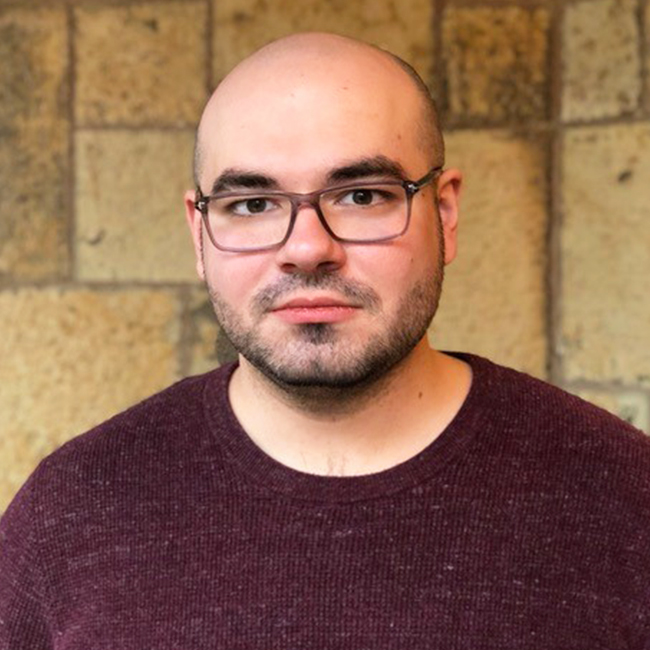
Senior Data Research Scientist, the Center for Social Norms and Behavioral Dynamics, University of Pennsylvania
Instructor, Master of Behavioral and Decision Sciences Program, University of Pennsylvania
Doctor of Philosophy in Demography and Sociology, the University of Pennsylvania ’17
Master of Arts in Demography, University of Pennsylvania ’17
Master of Arts in Statistics, The Wharton School, University of Pennsylvania ’17
Bachelor of Arts in Economics, Lomonosov Moscow State University ’10
Not long after he started working at Penn, Dr. Alex Shpenev discovered he still had a lot to learn. “I was asked to teach a graduate statistics class in the new behavioral sciences degree program as part of my postdoc work,” he begins. “And while the expectation is that once you get your job as an academic, you're supposed to teach, very quickly I realized the thing that they don't teach you during your doctoral studies is how to teach.”
Theorizing that a refresher in the student experience would improve his teaching methods, Alex decided to enroll in the Penn Alumni Program. “As you move further away from the time when you actually took classes,” Alex suggests, “you forget what it's like to be a student.” He hoped joining a class would help him navigate the teaching challenges he faced, like engaging his own students in course material and adapting to a rapidly increasing course enrollment. “I thought taking courses would be a great opportunity to see what other instructors were doing while experiencing a class from the student’s chair,” he says. What he discovered went beyond his expectations, not only sharpening his skills as an educator but also opening up an avenue for personal enrichment and rekindling old interests.
As a Penn degree holder (he has three degrees from Penn, in fact), Alex qualified for the Penn Alumni Program's streamlined enrollment process into School of Arts and Sciences undergraduate courses. At first, Alex thought taking behavior sciences courses was the logical choice. “Then I realized I could do something way cooler,” he says. “Back when I was an undergrad in Russia,” he explains, “I really wanted to be a medical doctor.” While his academic journey ultimately brought him to the social sciences, Alex now seized the opportunity to take the hard science courses he might have taken as a pre-med undergrad. “I signed up for classes like bio and physics,” he says.
Enrolling for credit while working full time was a big commitment, but one Alex saw as necessary. He had already tried to glean teaching techniques as a passive observer in some of his colleagues’ classes. The experiment, however, only verified a behavioral sciences principle he already knew to be true: “Unless something is at stake—unless there is a cost to you—it will have no value for you,” he summarizes. “If you're not taking a class for credit,” he continues, “you're likely not going to do the assignments or actively participate. So, since I have the option, why not enroll in a course and benefit from that?” he asks.
The plan paid off. His hard science courses provided Alex with first-hand experiences in an active learning classroom environment, comprised of more varied and interactive educational strategies than a traditional lecture. Lesson plans, Alex shares, included structured in-class activities and small group problem-solving that encourage student-to-student engagement.
As a student, Alex was drawn in. As a teacher, he adapted his own lesson plans to include active learning. “I try to make sure everyone in the classes I teach is engaged and that there are incentives to participate,” he says. Instead of long lectures, Alex breaks up sessions with shorter tasks, including mini competitions to solve assigned problems. “I time in-class exercises so no one gets bored, and the classroom just gets more dynamic.”
He has even found that lessons from the hard sciences can help introduce students to behavioral sciences. “I used to start a lot of my classes by talking about experiments where human subjects end up changing their behavior. But sometimes that’s difficult for students to grasp initially because those experiments are pretty complex. Now,” he says, “I start by talking about experiments from biology. Very often it just makes more sense to people.”
Today, Alex teaches four courses with the Master of Behavioral and Decision Sciences program in addition to his work as a data scientist at the Center for Social Norms. He credits the Penn Alumni Program with helping him become a more confident teacher. “Right now, I’m developing new classes and I’ve been turning a set of notes from my classroom into a textbook,” he shares. “I'm very happy with the job that I'm doing and I’m invested in teaching and continuing to improve my teaching style,” he says.
While his professional life is keeping him busy, Alex plans to continue taking courses for personal interest. Now that he’s explored the hard sciences, creative writing or classical studies may be in his future. “Ancient Greece was my favorite topic when I was a high school student, so I'm sure it'll be fun to dive back in,” he shares.
“Penn offers a lot of really fun classes that can expand your horizons,” he says. “I've been enjoying this program so much, so I don't see a reason to stop.”



